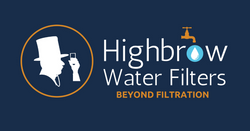The Complete Guide to Water Softeners
The Complete Guide to Water Softeners by Highbrow Water Filters
What is Hard Water, and Why Does it Matter?
You've probably heard the term "hard water" before—it usually comes as a criticism of your tap water's quality because it's not great for your body or your home. Although it's not a health hazard, it is a detriment to your home's long-term health.
Hard water is packed with minerals. When you use it in your home, you'll see the residue left on your dishes and faucets. It dries out your skin and hair, and it can even damage your pipes and appliances over time, causing blockages that slow water flow.
A lot of people in the US believe that hard water isn't an issue in their homes, but over 85% of homes in America have hard water. With hard water being such a common issue, it's likely your home suffers from this problem, too. So, what can you do about it?
Water Softener Basics: What is a Water Softener?
Water softeners do exactly what you might expect: they soften hard water by filtering out minerals such as calcium and magnesium. Water softeners are small water filtration systems (generally about four feet tall and less than one foot wide) that must be hooked up to a water source, a drain, and a power supply.
Usually, water softeners are installed next to your home's hot water heater to keep your entire system centralized.
What are the Benefits of Installing a Water Softener?
The high levels of mineral particles present in hard water—particularly calcium and magnesium—interfere with many things in the home. They prevent soaps and detergents from working as well as they could, dry out skin, and leave residue in pipes and appliances (and these are just a few of the detrimental effects of hard water).
When you install a water softener, you can expect:
- cleaner clothes and dishes
- to need less soap and detergent
- less or no mineral residue on counters, dishes, and faucets
- reduced mineral buildup in pipes and improved water flow
- improved performance and lifespan of appliances that use water
- better cost efficiency of appliances that use water
- your water to feel gentler on your skin and hair
If you experience dry, itchy skin or scale buildup in your home, those are tell-tale signs that hard water may be negatively affecting your home.
How Do Water Softeners Work?
A common belief is that there are two main types of water softeners: saltwater and saltless. And there's a lot of misconceptions about how they compare. In reality, there are a few different ways to soften water, including lime softening, ion-exchange resins, nanofiltration, and reverse osmosis.
For now, let's talk about how the more popular option works: saltwater softeners, which utilize ion-exchange resins to remove the minerals responsible for hard water.
How Saltwater Softeners Work
Saltwater softeners contain a material that filters out the hard minerals in your water. This filter consists of a porous plastic resin covered with molecules that attract positive ions dissolved in the water. Once those dissolved ions (the minerals) touch these molecules, they get stuck.
In a saltwater softener, the filter is covered with sodium ions. As the calcium and magnesium ions stick to the filter, they replace those sodium ions, which then get released into the water.
Once the resin is covered with a high concentration of magnesium and calcium ions, it needs to be cleaned. The water softer does this automatically once every few days, usually in the middle of the night.
A water softener cleans itself by rinsing its filter with a highly concentrated saltwater solution. During this process, sodium takes the place of calcium and magnesium, creating a super hard water solution. This liquid is disposed of down the drain, and things resume as normal.
What's the Difference Between Water Softener and a Salt-Free Water Softener/Conditioner?
The main differences between water softeners and water conditioners are what they remove from the water and how they do it.
Water softeners soften water by replacing hard minerals like calcium and magnesium with salt. Salt-free softeners, sometimes referred to as water conditioners, keep hard minerals from sticking to pipes and dishes—they don't remove the minerals or add any salt.
What Are the Benefits of a Saltless Softener?
The key benefits of choosing a saltless water softener (aka a water conditioner) over a saltwater softener (usually referred to simply as a water softener) include:
- reduction of scale through restructuring hard minerals
- no added sodium to your water, which is safer for the environment and required in some states
- no need to carry heavy salt bags, which usually weigh 40 lbs.
- no wasted water
- safer for the environment
- doesn’t have that “slick” feeling when showering or washing hands.
However, a water conditioner or "saltless softener" will not:
- remove hard minerals
Can You Use a Water Softener and a Water Conditioner at the Same Time?
No. While using independent water softeners and water conditioners together is not dangerous, it often renders them ineffective, regardless of which one filters the water first. If you're interested in receiving water softening and conditioning, consult a professional about installing a multi-stage water system that can meet all your needs.
Is A Saltless Softener Better Than A Salt Softener?
Since water softeners that use salt and salt-free water conditioners function differently and produce distinct results, choosing which is best is difficult. However, most consumers are trending towards salt-free water conditioners because they have many benefits for your home and the environment. Saltless water softeners also require less maintenance since you don't need to feed it heavy bags of salt or drain it.
Before you decide to soften water, know that some people dislike the slippery feeling of softened water. If you do, you definitely want the saltless softener!
To learn more about water softeners, discover which option is the best for your home, or receive a quote for water softener installation, contact our team of experienced professionals at Highbrow Water Filters today.
Sources:
Photo by Max Vakhtbovych from Pexels
https://www.idahowatersolutions.com/water-softeners/the-truth-salt-vs-salt-free-water-softeners
https://www.culligan.com/support/product-information/what-is-a-water-softener
https://homewater101.com/articles/hard-water-across-us
https://www.water-rightgroup.com/resources/where-is-the-best-location-for-a-home-water-softener/
https://www.scientificamerican.com/article/how-do-water-softeners-wo/
https://en.wikipedia.org/wiki/Water_softening
https://www.raynewater.com/blog/difference-between-a-water-conditioner-vs-water-softener/
https://www.hydroflow-usa.com/Water-Conditioner-vs-Water-Softener
https://www.hillwater.com/blog/p-8-water-softener-vs-water-conditioner.aspx


Leave a comment